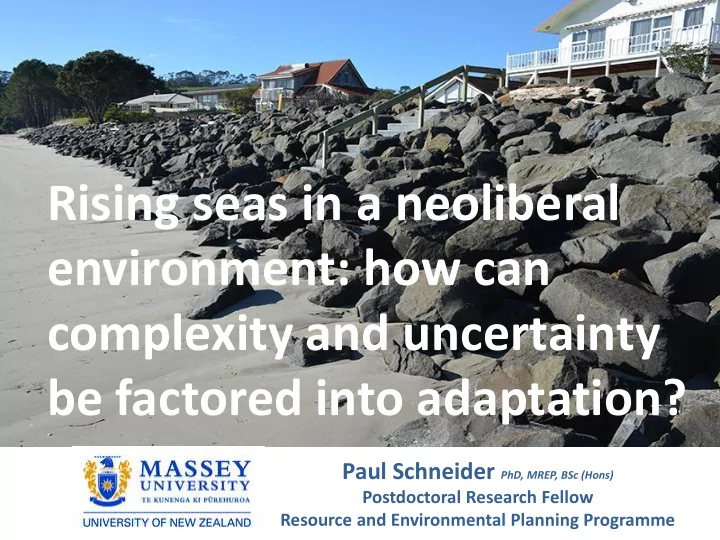

Rising seas in a neoliberal environment: how can complexity and uncertainty be factored into adaptation? Paul Schneider PhD, MREP, BSc (Hons) Postdoctoral Research Fellow Resource and Environmental Planning Programme
“[ f]orward planning is crucial to adapt to potential impacts of climate change at the coast ” (NIWA, 2011, para. 9).
• In 2010 the wealthiest 1% of Kiwis owned 18% of the wealth, • the wealthiest 10% had 54%, and • the wealthiest 50% had 96% of the wealth. http://morganfoundation.org.nz. Retrieved 08.11.2015
http://morganfoundation.org.nz. Retrieved 08.11.2015
1989 2016
“The financial power of special interests” Hansen et al., 2012, p. 17
The Coromandel Peninsula
Whitianga Waterways, 2012
http://www.climate-lab- book.ac.uk/files/2016/05/spiral_optimized.gif
• http://www.theguardian.com/environment/n g-interactive/2015/apr/10/how-much-fossil- fuel-are-we-using-right-now
2015: New Sustainable Development Agenda 2015: Sendai Framework 2012: Rio+20 Event on Sustainable 2015: Paris Development Agreement 2009: Copenhagen Accord 1992: Rio Earth Summit 1988: IPCC established Sanford, Frumhoff, Luers, & Gulledge, 2014
In the future, the tide gauges at the four ports will record exceedances of today’s 100 year events more and more often (“Preparing New Zealand for Rising Seas” Parliamentary Commissioner for the Environment Report, 2015, p. 30)
You just shouldn’t be there at all. Because a hundred years will be over, the house will be under threat, a problem has been created that everyone knew existed and the response will damage and impact on the emotions of the home-owner, society and the economy. Why create a problem in the first place? (Regional Council Coastal Manager, 2013, pers. comm.) “We design for the 100 year event but I ask why not for the 500 year event? Why the 100 year event? The 100 year event in ten years time is possibly going to be twofold if we continue to go down the path we’re going. So why? “ (beachfront property owner, 2012, pers. comm.).
Does policy rhetoric advance climate change adaptation?
“Climate change […] may change the frequency and intensity of hazards.” (p. 50)
“Often you have powerful councillors who have doubts about the science and then hold on to uncertainties so they don’t have to consider it....”. MFE spokesperson, pers. comm., 2012
“ New development now has appropriate set-backs and consideration of the environment. We now need to pay attention to what the natural environment is going to do . The coastal environment is very dynamic ” Project Manager, Regional Council, 2012.
Mercury Bay, 2012
“Things like this are happening all over the coast” (beachfront property owner, 2012, pers. comm.) Hahei, 2016
“Any one of those guys has more access to political power than half of the rest of the community put together. You don’t buy a beachfront property if you are poor, so people have a lot of economic and political power. These people are simply the movers and shakers in our society. Beachfront properties, that’s how it is... erosion reaches their boundary and it gets stopped and environmental regulations go out the window, public interests go out the window.” (Coastal Scientist, 2012, pers. comm.)
“It boils down to who has the most power and at the moment the power is not with the community …” Local Council Project Manager (2012, pers. comm.)
“Don’t know. Do I care ... mmmh , don’t know. All the global warming and sea rising, I don’t think it’s a major issue really. Although if anybody is affected ... (pauses) ... we are”. Beachfront property owner, pers. comm., 2012
“There is a lot of science that says that climate change is not the case”. New Zealand Transport Agency Executive, 2012, pers. comm.
“I don’t believe we are making that huge an impact.” National Party MP, 2012, pers. comm.
It’s a cycle. It doesn’t mean that we are putting out more gases or anything necessarily, it’s just a cycle”. Waikato Regional Council Representative Hazards and Emergency Management (2012, pers. comm.)
“Politics at the local level are fuzzy. It’s a tricky one”. Thames Coromandel District Mayor, pers. comm., 2012
Of course we all know that probably with a storm raging and if an elected member is there, even if they are not allowed to, they’ll say “yes – for heaven’s sake: dump rocks!”. What is supposed to happen in that situation is that the rocks have to either be removed ... who pays for that? Or a resource consent is sought ... who goes for the resource consent? Who pays for the resource consent? Local Council Senior Planner, 2012, pers. comm.)
“Well , one way or the other we pay for it. We either lose land or we pay for these ugly rocks and the loss of the beach and tourism. We’ve already thrown millions of dollars at the coastal erosion problem and we are worse off than ever before because we are not addressing the bigger picture”. Local longtime resident, 2012, pers. comm.
“ Council should say [to beachfront owners]: you’ve got no one to blame but yourself, so why do you now expect the public agency to rush around in small circles trying to – again – put more rocks on the beach, compromising public values, certainly looking after private interests but not looking after anyone else’s interest”. MFE spokesperson, 2012, pers. comm.
“We have to draw a line [ …] we won't abandon private homeowners. We need direct action rather than a managed retreat [ …] before we start losing any houses. TCDC Mayor, 2014
“You can’t just let nature take its course. We are dealing with people who have invested money in the area. Authorities are here to provide services”. NZTA representative 2012, pers. comm.
“Business as usual prevails”. Thames Coromandel District Council spokesperson, 2013
(after Moser & Ekstrom, 2010)
Adaptation pathway 1. understanding needs to be created 2. Community Vision 3. Sequenced manageable steps (choice sets): adaptation tipping points 4. Readiness is key
collective risk management (understand) Agree on triggers / adaptation tipping poin (plan) M ust be followed by steps that have previously been agreed on (manage)
Recommend
More recommend